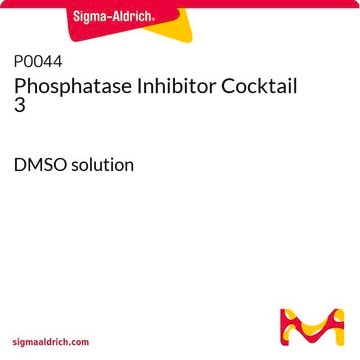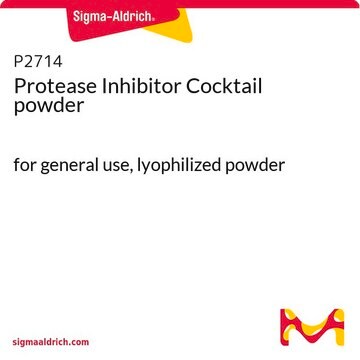P5726
Phosphatase Inhibitor Cocktail 2
aqueous solution (dark coloration may develop upon storage, which does not affect the activity), for the inhibition of tyrosine protein phosphatases, acid and alkaline phosphatases
Synonym(s):
Protease inhibitor
About This Item
Recommended Products
product name
Phosphatase Inhibitor Cocktail 2, aqueous solution (dark coloration may develop upon storage, which does not affect the activity)
form
aqueous solution (dark coloration may develop upon storage, which does not affect the activity)
Quality Level
shipped in
wet ice
storage temp.
2-8°C
Related Categories
General description
Application
Biochem/physiol Actions
Features and Benefits
Caution
Preparation Note
also commonly purchased with this product
related product
Signal Word
Danger
Hazard Statements
Precautionary Statements
Hazard Classifications
Eye Irrit. 2 - Repr. 1B - Skin Irrit. 2
Storage Class Code
6.1C - Combustible acute toxic Cat.3 / toxic compounds or compounds which causing chronic effects
WGK
WGK 2
Certificates of Analysis (COA)
Search for Certificates of Analysis (COA) by entering the products Lot/Batch Number. Lot and Batch Numbers can be found on a product’s label following the words ‘Lot’ or ‘Batch’.
Already Own This Product?
Find documentation for the products that you have recently purchased in the Document Library.
Customers Also Viewed
Articles
The use of phosphatase inhibitors is critical for all types of phosphorylation studies. Compare phosphatase inhibitor cocktails to select the best one for your research.
Discover Bioactive Small Molecules for Kinase Phosphatase Biology
Discover Bioactive Small Molecules for Kinase Phosphatase Biology
Discover Bioactive Small Molecules for Kinase Phosphatase Biology
Our team of scientists has experience in all areas of research including Life Science, Material Science, Chemical Synthesis, Chromatography, Analytical and many others.
Contact Technical Service













